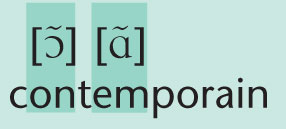Section 2.3
2.3.1 Les nombres, les jours et les dates
In this session, you will be studying numbers, days and dates.
Key Learning Points
Using the numbers 20 to 69
Talking about dates
Pronouncing the sound [ã]
Using possessive adjectives: votre, mon, son
Using quel, quelle
Activité 19
1. Listen to the following numbers in Extract 52 and repeat in the pauses.
Écoutez et répétez.
20 – 30 – 40 – 50 – 60
Écoutez et parlez dans les pauses.
2. Listen to the numbers in Extract 53 and repeat. What is the recurring pattern?
Écoutez et répétez.
21 – 31 – 41 – 51 – 61
Écoutez et parlez dans les pauses.
-
3. Listen to the following numbers in Extract 54 and repeat.
Écoutez et répétez.
22 – 33 – 44 – 55 – 66
Écoutez et parlez dans les pauses.
4. By following the pattern from Extract 54, can you say the following numbers?
Comment prononcer les chiffres suivants?
25–37 –56 – 68–43
Answer
Check your answers on the audio and in the transcript below.
21: vingt et un; 31: trente et un; 41 quarante et un; 51: cinquante et un; 61: soixante et un. Note that for numbers ending in un, you add et between vingt, trente etc. and un .
22: vingt-deux; 33: trente-trois; 44: quarante-quatre; 55: cinquante-cinq; 66: soixante-six. This time, you just say the vingt, trente etc. and follow it straight away by the second digit.
Following the previous pattern, say the numbers as follows: 25: vingt-cinq; 37: trente-sept; 56: cinquante-six; 68: soixante-huit; 43: quarante-trois
Learning numbers
To learn numbers, you should practise saying them as often as you can. You could read the number plates of cars, do multiplication tables in French, read shop prices to yourself and so on.
Pronouncing the sound [ã]
Some of the numbers you have been learning contain the nasal vowel [ã]:
| trente, | quarante, | cinquante, | soixante, | Cent |
| 30 | 40 | 50 | 60 | 100 |
The sound [ã] is heard in some months and days of the week:
months: janvier, septembre, novembre
days of the week: vendredi (Friday), dimanche (Sunday)
![]()
English speakers often have difficulty in distinguishing between [ã], as in cancan (a type of dance) and [5] as in bonbon (sweet). For example, when you listened to Extrait 51 you may have noticed these two sounds in the phrase centre d'Art contemporain.

Examples of this sound are recorded in Extract 55.

Extrait 55: écoutez et répétez:
